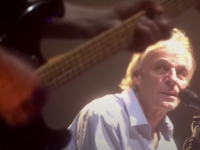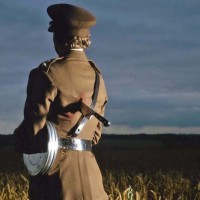Pink Floyd’s late co-founder Richard Wright, more often than not, was the guy keeping to himself while outsized personalities like Syd Barrett, Roger Waters and David Gilmour drew all of the attention. Still, he made a number of important contributions to the band’s space-rock legend over the years.
Gilmour, in eulogizing the late founding keyboardist back in 2008, admitted as much: “He was gentle, unassuming and private but his soulful voice and playing were vital, magical components of our most recognized Pink Floyd sound,” Gilmour wrote on his web site. “In my view, all the greatest PF moments are the ones where he is in full flow.”
Here’s a list of 10 of them …
“GREAT GIG IN THE SKY,” (DARK SIDE OF THE MOON, 1973): Richard Wright’s “Great Gig” is built on a ruminative piano signature, something egg-shell fragile and utterly beautiful. But, in keeping with his underrated presence in Pink Floyd, all anybody remembers is the shatteringly emotional vocal turn by Clare Torry. Her performance was a last-minute decision, replacing a series of liturgical readings from when the demo was known as “The Religion Song.”
“INTERSTELLAR OVERDRIVE,” (PIPER AT THE GATES OF DAWN, 1967): One of Pink Floyd’s initial forays into psychedelic improvisation, this free-form 10-minute event — credited to Richard Wright, along with Barrett, Waters and drummer Nick Mason — features a trippy organ line from Wright that moves from speaker to speaker in the stereo mix. Wright then intriguingly explores his keyboard while Barrett does unspeakably weird things to his guitar. As wild, and as explorative, as this take might sound, Pink Floyd later did a half-hour version in concert.
“WEARING THE INSIDE OUT,” (THE DIVISION BELL, 1994): After a three-album dry spell, Wright returned for The Division Bell with all of his creative juices flowing. That he could put together something so delicately moving as “Wearing the Inside Out,” after having barely contributed to 1979’s The Wall and 1987’s Momentary Lapse of Reason while being completely absent for 1983’s The Final Cut, made an out-of-nowhere gem like this all the more impressive.
“ONE OF THESE DAYS,” (MEDDLE, 1971): Composed by Waters, Wright, Mason and Gilmour, this rumbling instrumental opened Meddle, and served as a staple at Pink Floyd’s concerts in both the 1971-73 and 1987–94 eras. “One of These Days” has been described by Gilmour as one of the group’s most collaborative ever; Mason, the drummer, even gets a brief speaking part. As for Wright, his surging washes add just the right sense of portent.
“SEE-SAW,” (A SAUCERFUL OF SECRETS, 1968): Richard Wright’s second original track on Saucerful found his typically over-looked talents on full display, as a singer, songwriter and multi-instrumentalist. In fact, he’s featured on organ, piano, xylophone and mellotron — all in service of a whimsical, light-filled vocal that telegraphs the successes Wright would have on signature later tracks like “Us and Them” and “Time.”
“ASTONOMY DOMINE,” (PIPER AT THE GATES OF DAWN, 1967): Co-written with Barrett, this freak-out instrumental crystallized everything that Pink Floyd was aiming for in long-form explorations like “Interstellar Overdrive.” Richard Wright provides a sweeping dreamscape for the song’s outer-limits theme, something he got to show off all over again when “Astronomy Domine” served as the early-tour opener behind his Floyd comeback on The Division Bell.
“US AND THEM,” (DARK SIDE OF THE MOON, 1973): Long associated with Gilmour, who voiced it, this song actually began as part of Richard Wright’s work on the 1969 film Zabriskie Point. With new lyrics from Waters highlighting the project’s theme of isolation, and a more jazz-oriented structure from Wright, “Us and Them” would became a critical element in Pink Floyd’s biggest album ever.
“ECHOES,” (MEDDLE, 1971): This 23-minute song is, of course, filled with instrumental wonders — not least of which is a surging organ solo from Richard Wright said to be inspired by the Beach Boys’ “Good Vibrations.” But “Echoes” also stands as a testament to the every-day miracles that happened when Wright and Gilmour shared the mic. “The blend of his and my voices and our musical telepathy,” Gilmour said in his Wright eulogy, “reached their first major flowering in 1971 on ‘Echoes.'”
“SHINE ON YOU CRAZY DIAMOND,” (WISH YOU WERE HERE, 1975): A nine-part composition with additional contributions from both Waters and Gilmour, “Shine On” is Richard Wright’s virtuoso musical moment. The song’s subject, a loving tribute to the by-then quite mad Barrett, often takes a backseat to co-writer Wright’s lengthy turns on the mini-Moog. Later, he adds ARP String Ensemble Synthesizer, piano then Hohner Clavinet — and Pink Floyd’s last truly collaborative project is made complete. “Without his quiet touch,” Gilmour said, “the album Wish You Were Here would not quite have worked.”
“TIME,” (DARK SIDE OF THE MOON, 1973): Richard Wright once again shared vocals with Gilmour on the band co-written “Time,” as they explored the idea of lost opportunities. Consistently performed live during Floyd’s 1972-75 and 1987-94 tours, this would often be Wright’s most memorable showcase, though his turn at the mic was — of course — often forgotten amidst Gilmour’s eruptive soloing. Still, from his request that its now-iconic cover image be something “simple and bold,” to notable contributions on this cornerstone track, Wright’s fingerprints are all over Dark Side of the Moon.
- How Deep Cuts on ‘Music From Big Pink’ Underscore the Band’s Triumph - July 31, 2023
- How ‘Islands’ Signaled the Sad End of the Band’s Five-Man Edition - March 15, 2022
- The Band’s ‘Christmas Must Be Tonight’ Remains an Unjustly Overlooked Holiday Classic - December 25, 2016




